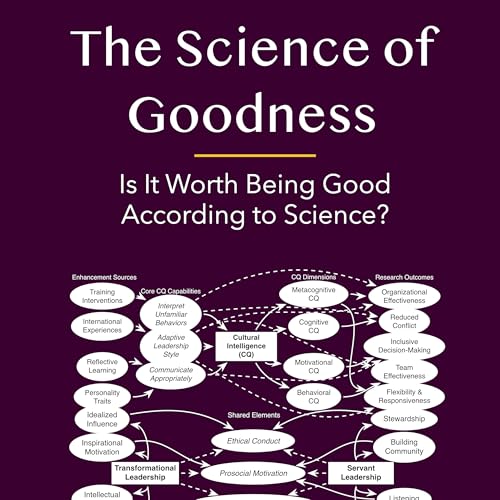
Do nice guys really finish last?
カートのアイテムが多すぎます
カートに追加できませんでした。
ウィッシュリストに追加できませんでした。
ほしい物リストの削除に失敗しました。
ポッドキャストのフォローに失敗しました
ポッドキャストのフォロー解除に失敗しました
-
ナレーター:
-
著者:
このコンテンツについて
In this episode, drawing on the research found in The Science of Goodness: Is It Worth Being Good According to Science? by Milan Toma, we explore the thoroughly examined intersection of character and corporate success: Goodness in Leadership.
We analyze empirical evidence demonstrating that goodness is not merely an aspiration, but a foundational element of effective leadership. Learn how good-hearted leaders, who embody empathy, integrity, and ethical conviction, consistently foster trust, engagement, and resilience within their organizations.
Key topics discussed include:
Personality Traits in Leadership: A review of meta-analytic studies showing that Big Five traits such as extraversion (r = 0.31) and conscientiousness (r = 0.28) are robust predictors of leadership effectiveness. We examine how these traits influence leadership styles and decision-making processes.
The Power of Emotional Intelligence (EI) and Empathy: Discover why EI and empathy are considered central pillars of effective and ethical leadership. Empirical research consistently reveals a strong positive association between high EI and effective leadership, often correlating in the moderate to strong range (≈ r = 0.3 to 0.5 or higher). Empathetic leaders are better equipped to build trust, manage conflict, and create environments of psychological safety, which enhances team cohesion and innovation.
Ethical Leadership and Integrity: We define ethical leadership—which involves modeling and promoting normatively appropriate conduct through fairness, transparency, and accountability—and its role in deterring organizational misconduct. We also cover how established theories like Transformational Leadership and Servant Leadership emphasize prosocial motivation and the development of followers.
Cross-Cultural Perspectives: Understanding that while core attributes like empathy and EI are universally beneficial, their optimal expression is shaped by cultural context.
The Strategic Value of Goodness: We conclude with the finding that being good is a moral imperative and a practical advantage that yields sustainable organizational success, a positive workplace culture, and a meaningful societal impact.
This episode provides a detailed overview of what it means to be a "good-hearted" leader and why such leadership is essential for organizations and society.


